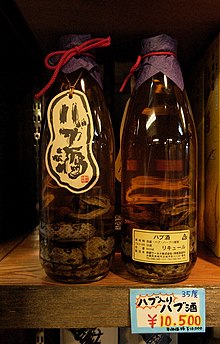This article needs additional citations for verification. (October 2011) |


Awamori (泡盛, Okinawan: アームイ, āmui) is an alcoholic beverage indigenous and unique to Okinawa, Japan. It is made from long grain indica rice,[1] and is not a direct product of brewing (like sake) but of distillation (like shōchū). The majority of awamori made today uses indica rice imported from Thailand, as the local production is largely insufficient to meet domestic demand, which has risen considerably in recent years.
Awamori is typically 60–86 proof (30–43% alcohol), although "export" brands (including brands shipped to mainland Japan) are increasingly 50 proof (25% alcohol).[2] Some styles (notably hanazake) are 120 proof (60%) and are flammable. Awamori is aged in traditional clay pots to improve its flavor and mellowness.
The most popular way to drink awamori is with water and ice.[3] When served in a restaurant in Okinawa, it will nearly always be accompanied by a container of ice and carafe of water. Awamori can also be drunk straight, on the rocks, and in cocktails. Traditionally, awamori was served in a kara-kara, a small earthen vessel with a small clay marble inside. The marble would make a distinctive "kara-kara" sound to let people know the vessel was empty. These vessels are still found in Okinawa, but the clay marbles are often absent.
Another name for awamori used in Okinawa is "island sake" (島酒, shima-zake), or shima for short.
In general, the price of awamori increases with the beverage's age.
Kōrēgusu is a type of hot sauce made of chillis infused in awamori and is a popular condiment to Okinawan dishes such as Okinawa soba.
- ^ Pellegrini, Christopher (July 22, 2014). The Shochu Handbook – An Introduction to Japan's Indigenous Distilled Drink. Telemachus Press. p. 21. ISBN 978-1940745282.
- ^ "Awamori - Kampai!".
- ^ Pellegrini, Christopher (July 22, 2014). The Shochu Handbook – An Introduction to Japan's Indigenous Distilled Drink. Telemachus Press. p. 67. ISBN 978-1940745282.